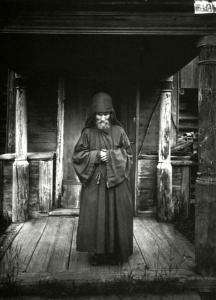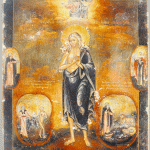
In the Systematic Collection of the Sayings of the Desert Fathers, there are many apophthegms which offer us anonymous pearls of wisdom. While someone remembered what was said, they did not remember, or at least did not record, who said it. While some might think this represents a slight to the speaker involved, in reality, we should understand it is not. Rather, it follows the kind of spirituality many such speakers had, where they did not seek fame or prestige for themselves; they did not care for fame, or to be remembered for what they said. This allowed them to speak out of the goodness of their heart, as those who seek fame, often find that interest influence what they say, how they say it, and even the audience to which they speak. It really should not be surprising, with the way religious life advocates and promotes humility as being fundamental for a healthy spirituality, that we find many such anonymous statements are given, and the theme which connects them together is humility. To be humble, we must do more than engage self-abnegation, especially as false humility might employ such a practice to make ourselves look better in front of others. What we should be concerned about is addressing and eliminating excessive pride, wherever it can be found in our spiritual practice. Thus, as pride can make us look down upon others, humility would remind us that we should not do so, that even if we see someone committing some fault, we should be merciful to them and not judge them. For if we are judgmental, we might find that the way we judge others today, the way we do not show them mercy, will come back to us as people will judge us and not grant us mercy when we find ourselves falling into some temptation tomorrow. Thus, we should look to the way others fall into some temptation as a reminder as to what we might fall into if we are not careful. “One of the fathers wept bitterly when he saw somebody sinning, saying, ‘Him today; me tomorrow.’” [1]
Similarly, then, as the desert fathers and mothers learned from their elders to embrace humility, they learned that such humility should lead them away from engaging gossip and the judgment which comes from gossip. “An elder said, ‘The monk should neither hear nor speak evil of anybody, nor should he easily take offense.’” [2] Since the monastic profession, in a sense, should lead would-be monks to take upon themselves a life of penance, embracing ascetic principles to correct their own inordinate habits, they were encouraged to only look at and consider their own faults and failings. They were told that they should be fighting against their own sins and sinful habits and not go around looking at the sins of others to distract them from their own endeavors. And, though they are to embrace humility, and so make themselves look better than they are, they also did not want to have a bad reputation, to have people thinking ill of them, whether or not such gossip was true or not. This, of course, was used to remind them that as they hate it if others gossiped about them and their failings, others hare it when they did likewise, which is why they were told they should not speak of others in a similar fashion. Obviously, there is a limit to this, for if someone were actively engaging sins which could or would gravely harm the monastic community, or the greater community at large, they would have to be stopped, either through correction, or if they are unable to be corrected, with expulsion from the community. But, unless some extreme situation developed, they were encouraged to embrace silence over judgment, and to remember that if they did not do so, even if they were objectively correct when they made a particular judgment, they lost sight of charity, and with it, the virtue which they claimed to hold. This, many of them discovered, was especially true in regards sexual sins; while many would-be holy men and women looked down upon others who found it difficult to embrace chastity, the judgment they made would lead back to their own condemnation, as they found themselves making the kind of rash judgments charity says are not to be made:
An elder said, “Judge not the one who indulges in porneia even if you are chaste [yourself], for in so doing, you too transgress the law – because he who said, ‘Do not indulge in porneia [see 1 Cor 10], also said, ‘Do not judge’” [Matt 7:1].[3]
Clearly, that saying applies, not just to the desert fathers and mothers, but to all of us. We violate the principles we are expected to follow, just as much as, if not more than, those we judge when we judge them. If we carefully note how and why we make such judgments, it becomes clear, we do so as a way to turn them into scapegoats. That is, when we make such a judgment, it is often done as a form of deflection (and projection). The more we condemn others, trying to place the blame of all society’s ills on them, the more we find ourselves turning away from the charity we should have, and so the further we are from the holiness and virtue which we act as if we have to make such a judgment call. And so, as most spiritual masters realize, we should avoid, as much as possible, the judgmental spirit, realizing we embrace it as a way not only to push others down and make them appear worse than they are in reality, but also as a way to make ourselves look superior to others. Such pride, of course, will only lead to our own self-ruin.
It is also important to note, what we judge, more often than not, is only what we can obverse, that is, how things appear to be. We only see the external action, but we do not know the internal, subjective state of the person involved. This means, we do not have what it takes to truly offer a proper judgment of the situation: “Should somebody sin in your presence in any way, judge him not but regard yourself as more sinful than him. You see the sin, but you do not see the repentance.” [4] This, returns us to one of the key principles behind much monastic discipline, that we are to first deal with and consider our own sins, and to do so with all humility, accepting our failings but also accepting the help and grace which is offered to us so we do not fall into the pit of despair with self-hatred. What is important, then, is to act in charity, to do good, to help, with the best of our ability, those who are struggling with temptation. In this way, we begin to engage the image of God which can be found within them, the image which is made in the image of love; by doing so, we will come to know and honor God better:
A brother asked an elder, “How can a man receive the grace of loving God?” In answer he said, “If some one sees his brother slipping and calls on God for help on his behalf, then he acquires understanding of how one should love God.” [5]
We can and should do all we can do to help others. But, since we are all limited to what we can and cannot do, we should recognize our limitations. If we can’t do anything else, it is good to pray for others, but if we can do more, we should do what we can. We should lift people up the best we can. Promoting their well-being in this fashion will help them far more than judging them will. This, then, is something which many of the desert fathers and mothers learned, and something which, however difficult it is for us, is something we should learn, not, of course, as a way to undermine justice, but as a way to make sure charity, love, continues to thrive as we engage the work of justice itself. What is important is that we truly desire to help someone, realizing it becomes impossible for us to do so if all we do is look for some reason to judge or condemn them. The more we have a judgmental spirit, the more we end up developing our own pride and end up establishing our own condemnation. When that happens, what will we want, someone who is compassionate with us and helps us, or someone who will treat us as we have treated others?
[1] John Wortley, trans. The Book Of The Elders: Sayings of the Desert Fathers (Collegeville, MN: Cistercian Publications, 2012), 138 [N327].
[2] John Wortley, trans. The Book Of The Elders: Sayings of the Desert Fathers, 182 [N386].
[3] John Wortley, trans. The Book Of The Elders: Sayings of the Desert Fathers, 138 [N11; Theodotus 1].
[4] John Wortley, trans. The Book Of The Elders: Sayings of the Desert Fathers, 139 [N327].
[5] John Wortley, trans. The Book Of The Elders: Sayings of the Desert Fathers, 307 [N636].
Stay in touch! Like A Little Bit of Nothing on Facebook.
If you liked what you read, please consider sharing it with your friends and family!













